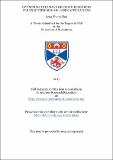Files in this item
Optimising the usage of cloud resources for execution bag-of-tasks applications
Item metadata
| dc.contributor.advisor | Barker, Adam David | |
| dc.contributor.advisor | Varghese, Blesson | |
| dc.contributor.author | Thai, Long Thanh | |
| dc.coverage.spatial | xx, 160 p. | en_US |
| dc.date.accessioned | 2018-07-23T11:10:37Z | |
| dc.date.available | 2018-07-23T11:10:37Z | |
| dc.date.issued | 2017 | |
| dc.identifier.uri | https://hdl.handle.net/10023/15642 | |
| dc.description.abstract | Cloud computing has been widely adopted by many organisations, due to its flexibility in resource provisioning and on-demand pricing models. Entire clusters of machines can now be dynamically provisioned to meet the computational demands of users. By moving operations to the cloud, users hope to reduce the costs of building and maintaining a computational cluster without sacrificing the quality of service. However, cloud computing has presented challenges in scheduling and managing the usage of resources, which users of more traditional resource pooling models, such as grid and clusters, have never encountered before. Firstly, the costs associated with resource usage changes dynamically, and is based on the type and duration of resources used; this prevents users from greedily acquiring as many resources as possible due to the associated costs. Secondly, the cloud computing marketplace offers an assortment of on-demand resources with a wide range of performance capabilities. Given the variety of resources, this makes it difficult for users to construct a cluster which is suitable for their applications. As a result, it is challenging for users to ensure the desired quality of service while running applications on the cloud. The research in this thesis focuses on optimising the usage of cloud computing resources. We propose approaches for scheduling the execution of applications on to the cloud, such that the desired performance is met whilst the incurred monetary cost is minimised. Furthermore, this thesis presents a set of mechanisms which manages the execution at runtime, in order to detect and handle unexpected events with undesirable consequences, such as the violation of quality of service, or cost overheads. Using both simulated and real world experiments, we validate the feasibility of the proposed research by executing applications on the cloud with low costs without sacrificing performance. The key result is that it is possible to optimise the usage of cloud resources for user applications by using the research reported in this thesis. | en_US |
| dc.language.iso | en | en_US |
| dc.publisher | University of St Andrews | |
| dc.subject.lcc | QA76.585T5 | |
| dc.subject.lcsh | Cloud computing | en |
| dc.title | Optimising the usage of cloud resources for execution bag-of-tasks applications | en_US |
| dc.type | Thesis | en_US |
| dc.contributor.sponsor | Engineering and Physical Sciences Research Council (EPSRC) | en_US |
| dc.type.qualificationlevel | Doctoral | en_US |
| dc.type.qualificationname | PhD Doctor of Philosophy | en_US |
| dc.publisher.institution | The University of St Andrews | en_US |
This item appears in the following Collection(s)
Items in the St Andrews Research Repository are protected by copyright, with all rights reserved, unless otherwise indicated.

